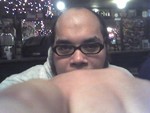Stress Monkey: Katrina; I Too Am Worthy
There's a passage in Julie Salamon's The Devil's Candy*, where Brian De Palma compares his experience during the production schedule on any of his movies to a large and lengthy tunnel he slides down.
At the beginning of the process, the tunnel is about as spacious as a hangar, the speed's pretty lugubrious, and you can't see the other end. The further in you go, the steeper the incline, the faster the speed, and the closer the walls. You finally see the other end of the tunnel maybe 2/3 of the way through. The walls get closer the more stressful the situation. Sometimes more breathing room is gained, especially after a good day, or some breakthrough is achieved. You hope to avoid having the walls close in enough to stop you.
I think of that scenario every time I direct a show.
Katrina is two weeks away from opening, and while I can see the end of the tunnel, there are days where those walls are within arm's reach. There've been nights this last week where I got about three hours worth of sleep, and those were after good nights of rehearsal (I couldn't shut my brain down, ideas were flowing freely).
And yet, for all of the hand wringing, sleepless nights, and crabbypantsitude, if you were to find me in an objective mood and ask me if I'd do it all over again, my answer would be a resounding "mufuggin' hell yeah!" if only for the sense of accomplishment. It ain't climbing Mt. Everest, but it'll do for me.
At the point I'm currently in, it helps me to go back to what I found engaging about the project. For Sunken, it was the blend of wry family discourse coupled with gonzo zombie theatrics onstage. For Dark Ride, it was presenting a cohesive and challenging enigma to an audience used to linear storytelling. For The Ritz, it was placing farcical slapstick in a generally hostile venue.
In the case of Katrina, it's all about telling this story. The sharing of an emotional rollercoaster in a town known for its repressiveness. The raising of a topic that, despite lip service to the contrary, is still being ignored by the man in charge of this country. The telling of a story that, despite its weightiness, is still funny, touching, and engaging.
The biggest challenge for me aren't the usual concerns, but in making sure that, in telling this story, I don't fall prey to the tempting excesses to be found therein: headpounding obviousness, maudlin sentimentality...or worse, in fear of being those things, I don't take a risk at all.
No pressure or anything.
*Highly recommend this book, for a fly-on-the-wall perspective on how Hollywood can fuck a good thing up.--tbo



5 Comments:
It never ceases to amaze me how, from the point where you are now, right up to opening night, it always seems like it's heading down the crapper. It's always weird to me to see that transition that happens right on opening night. I've always thought it was harder for the director, who really just has to take it on faith.
I do want to read that book. I believe that a lot of the problems with Hollywood filmmaking is that they waste a lot of time over-producing. The timelines you have in theater force you to be disciplined - if the act can't be pulled together by opening, then too bad!
Om.
Om.
Om.
Appreciate the thought, JJ, but I'm more of a Nam Myoho Renge Kyo dude myself.
Erased my long comment about things working out, blah, blah, blah.
Will replace with--I think it's amazing that you do what you do.
Thank you for the support, Jose. I'd like to share a passage from "The Norton Anthology" by Henry Louis Gates, Jr. and Nellie McKay with you and your fellow bloggers. It may help put your musings about the dearth of contemporary Black American playwrights into an historical perspective that may provide some causal insights.
"The resistance to the merits of black literature...has its origins in the Enlightenment and in the peculiar institution of slavery. The social and political uses to which this literature has been put have placed a tremendous burden on these writers, casting an author and her or his work in the role of synecdoche, a part standing for the ethnic whole, signifying who 'the Negro' was, what his or her 'inherent' intellectual potential might be, and whether or not the larger group was entitled to the full range of rights and responsibilities of American citizenship. Because of the perilous stature of African Americans in American society, their literature has suffered under tremendous extra literary burdens."
In 1773, Phyllis Wheatley had to endure a public inquisition convened by 10 of the most pre-eminent white men in Boston, who cross examined her to determine if she had the intellectual capacity to actually write a book of poetry. Upon the acquittal of her humanity before this august group, the 10 publicly pronounced that Ms. Wheatley did indeed possess the requisite intellect and skill to produce her “work of art.” Only then was her work published. Not in Boston, but in London. And so it goes.
Post a Comment
<< Home